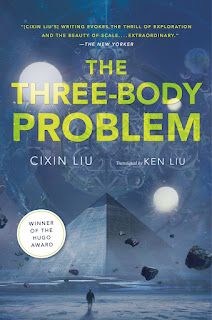Pages: 227
Goodreads,
Amazon
I rarely add books to my Goodreads "To-read" list because, firstly, I'm too lazy and, secondly, I try to read books based on chance encounters and leisurely discoveries rather than as a plan. Besides, being almost always confused about things doesn't help a reading plan much. But there are a few books in my "To-read" list based on someone's kind recommendations or the times when I stumble upon a book and liked it so much that I had to keep it in the list (only to be forgotten at a later time). Ray Bradbury's Fahrenheit 451 found a place in the list based on one such quirk.
Yamini was kind and smart enough to look up the list and gift it on my birthday after I quite shamelessly and repeatedly kept on asking her for a gift. By the way, I am so ignorant towards my "To-read" list that I deduced that this book existed in my list based on Yamini's tweet on blessing these lists for helping one decide a gift.
The fast-paced book is based in the year 2052. The world has achieved advancements in technology (there are four-walled televisions and TV shows in which one can participate as a character right from the comfort of one's home) but not so much ideologically (people are busy having fun by indulging in TV shows but nobody has any individuality of actions or thoughts). The administrative state seems to have grown extremely powerful in its endeavour to clamp down on any form of questioning thinking. There is a team of Firemen which is always on its toes promptly performing its duty of visiting homes and burning books. (451 degrees Fahrenheit is the temperature at which paper burns.)
The book is about Guy Montag, a Fireman who is on the verge of awakening from his ideological stupour. Deep down, Montag knows that something is wrong with everything. His wife is happily floating in the pleasures of TV and the company of her equally brain-dead friends. Montag's world changes when he comes across a free-minded girl (Clarisse) and an old man (Faber), both of whom are free souls, and who psychologically shake Montag up and inspire him to revolt against the system. Montag runs away from everything with the ambition of reestablishing a freedom of thought in the world.
Bradbury doesn't devote many pages to world or character building. He is out there to convey an emotion and he does it well succinctly. Montag seems torn between two worlds but we don't know much about him till the end. I didn't really feel much for Clarisse when she disappeared whereas Montag was terribly disconsolate.
The book touches upon the aspects of a grim future world, freedom of thought and most importantly, how books shape people. It is an expression of the author's love of books and I was blown away by the way that has he chosen to pour it into the words. It kept reminding me of the Matrix trilogy with Montag as Neo, Faber as Morpheus and Clarisse as Trinity.
The 60th anniversary edition of the book (with the above cover) has a history, context and criticism section which makes it a far more interesting read. Since the book itself is shorter than 200 pages, this section is not worth skipping as it has views of the author himself and famous reviewers about the book itself and its adaptation as an audiobook, a play and a movie.
Since the book was written and published in the 1950s, the narration is somewhat different from what I have come to know as modern literature. There seem to be occasional bumps in the flow of the narration because of the jumpy nature of the plot. There are a few instances, especially when Montag moves from one location to the other, when the characters seems to be daydreaming or on a psychological trip. I lost the narration completely at these points, however, it didn't matter much.
I loved every bit of the book and the fact that it makes books seem all the more important to people made it even more special to me.



























































































